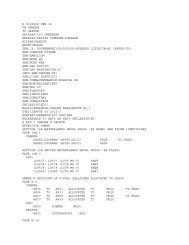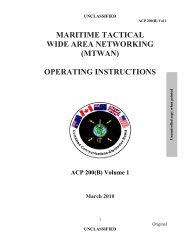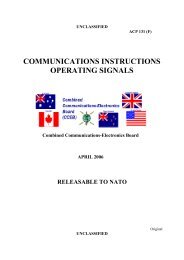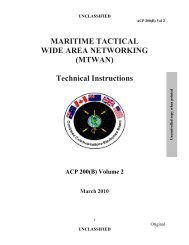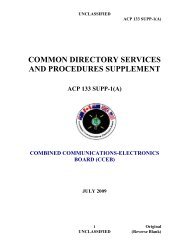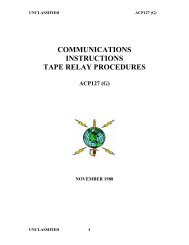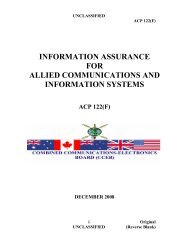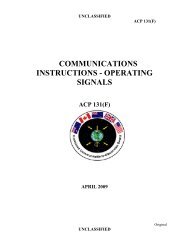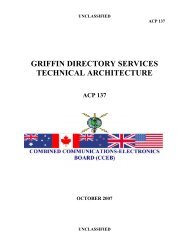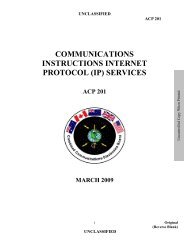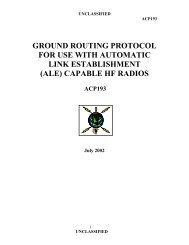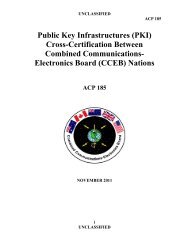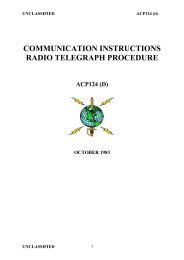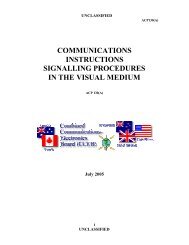ACP 194 - Multilateral Planners Conference
ACP 194 - Multilateral Planners Conference
ACP 194 - Multilateral Planners Conference
- No tags were found...
Create successful ePaper yourself
Turn your PDF publications into a flip-book with our unique Google optimized e-Paper software.
UNCLASSIFIED<strong>ACP</strong> <strong>194</strong>can be gained in international fora such as the ITU by having priorcoordination discussions to attempt to influence national positions duringpreparations for meetings of such fora. Combined military efforts arerequired with continual information exchange and participation in periodicmeetings necessary to review and react to developments.b. To keep abreast of civil developments, and to ensure that Defence goals arereflected in national policies, it is essential that frequency planners work invarious civil symposia and conferences that address spectrum management.In particular, conferences such as the Asia Pacific Telecommunity, AfricanTelecommunications Union, European <strong>Conference</strong> of Postal and TelecommunicationsAdministrations, Inter-American Telecommunication Commission,League of Arab States, and the Pacific Telecommunications Council`ITU Radiocommunications Sector meetings and World Radiocommunication<strong>Conference</strong>s (WRCs) should be monitored/ attended and military interestsrepresented. The investment to attend such meetings/conferences is smallcompared to the losses that will result if spectrum is withdrawn420. Technical Developmentsa. Technical advances in electronic equipment over the last decade have enabledmore and different S-D systems to be introduced. The military can takeadvantage of these developments when replacing systems by utilizing newtechnologies for S-D equipment particularly employing tighter technicalspecifications, particularly in radio receivers. Introducing such equipmentinto the civil sector will also help in achieving these advantages as it reducesthe potential for harmful interference. New technologies such as dynamicspectrum access would permit greater opportunities for sharing resulting inmore efficient use of the spectrum. Use of data reduction techniques anddigital signal processing may relieve some of the congestion in spectrumusage.CONCLUSIONS421. Multinational military organisations and the many non-warfighting functions theyperform provide an effective case to generate international support for continued adequatemilitary access for use of the EMS. However, it remains that national spectrummanagement authorities will determine the use of the EMS within their boundaries.422. The military must be prepared to argue its case at a political level for continuedadequate spectrum access. These arguments must be based on military operationalrequirements reflecting government policies and must include emphasis on informingnon-military authorities of military spectrum requirements.423. To assist in developing national military arguments, adequate financial and legalresources must be provided to ensure that Defence goals are protected in international andnational regulatory and spectrum allocation forums.424. Spectrum lost will not be recovered. This may jeopardise access for future militarysystems and impose restrictions on current operations and training.4-7UNCLASSIFIEDOriginal



